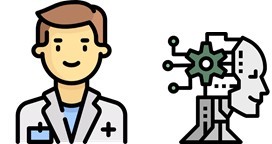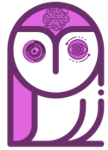The field of Artificial Intelligence has achieved amazing feats in the last decades. From beating the world champions at chess, Go, or many videogames to driving our cars and powering our virtual assistants, AI is behind many unenviable achievements. In this article we will speak about the amazing things that Artificial Intelligence in Medicine can do, has done, and will do!
Lets go!
Artificial Intelligence in Medicine: How can it help?

The healthcare sector, just like any other is becoming more and more data driven. Insanely big chunks of patient data are being produced every day, and in this ocean of data is precisely where Artificial Intelligence thrives.
Analysing these enormous amounts of data (in a secure and anonymous way using approaches like Federated Learning) can give us a better understanding of why some diseases happen, how to treat them better, and overall have a more scientific and objective diagnostic procedure.
Also, by studying historic patient data, the employed treatments, and the results, Machine learning models could help doctors with treatment recommendation.
Aside from that, AI is very well known for process automation: incorporating Natural Language Processing and other Artificial Intelligence driven improvements to some of the most tedious proceses of medical life could allow doctors to focus on more value added tasks, give them more time to be close to their patients, and overall be more efficient and happy.
While medical innovation has paved the way for the development of new drugs and procedures to treat patients more effectively, the issues of human error, fatigue, and poor system resourcing remain significant contributors to injuries and deaths in the healthcare system. Having more efficient and streamlined processes, and giving our medical experts all the help we can using intelligent systems would considerable reduce human error.
Also, AI in diagnostic medical imaging is undergoing extensive evaluation. AI has shown impressive accuracy and sensitivity in the identification of imaging abnormalities and promises to enhance tissue-based detection and characterisation.
Lastly, we have the use of Machine Learning and Artificial Intelligence in discovery and research, that is already achieving great results with feats such as Alphafold.
Artificial Intelligence in Medicine: considerations
All of the above seems pretty awesome, but we want to highlight various points on top of the power of AI in medicine and discuss some caveats.
First of all, in no case we think that automated system and recommendations by Artificial Intelligence should replace humans. We see these systems as assistants and helpers of our human experts, not as a replacement.
Secondly, medicine is inherently a human enterprise: caring for another person is something an algorithm can’t do so despite all the sophistication, efficiency, and knowledge that AI can bring to the table, humans will always have to be there.
Next, Artificial Intelligence models deployed in the healthcare sector would have to be explainable and easy to understand by their end users, distancing their-selves from black box neural networks.
Then we get into the issues of regulation. The laws in the HTC system are pretty rigid, and it takes a lot of time and effort to change them, not to mention that a change in these laws, incorporating AI, would also imply a needed change in the mentality of people and how they work.
To end there is always ethical considerations: Is using these kind of systems right? We’ve seen how bias can greatly affect AI systems in books like ‘Weapons of Math Destruction‘. These systems have to be built with a lot of care to avoid discrimination and possible errors, as they are directly interacting with the health and prosperity of many individuals.
- O'Neil, Cathy (Author)
- English (Publication Language)
- 288 Pages - 09/05/2017 (Publication Date) - Crown (Publisher)
Artificial Intelligence in Medicine: final thoughts
As we’ve seen Artificial Intelligence has the has the power to change our healthcare system, help out our doctors, better treat patients, and discover new and powerful medicines.
However, as any technology that comes close to this sector, it has to be approached with care, gradually, and only implemented in areas where there could be a real impact, where it is understood, and with a lot of care for bias.
In the coming years we will see more and more AI systems being implemented in the healthcare and research systems, so lets hope that the end result is as promising as the expectations.
If you want to learn more about AI and medicine, check out the awesome blog Glassboxmedicine, you will love it!
As always, thanks a lot for reading us and have a wonderful day!
Subscribe to our awesome newsletter to get the best content on your journey to learn Machine Learning, including some exclusive free goodies!


